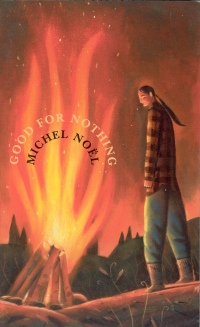| ________________
CM . . .
. Volume XI Number 15 . . . .April 1, 2005
excerpt:
Good For Nothing is the story of Nipishish, a Metis teenager, from May of 1959 to the spring of 1961. He leaves the residential school and is sent to a white foster family. Unable to cope with the abuse, he returns to the reserve where life is idyllic and he meets his true love again. He steals his files and those of his father from the band office and discovers that his father was probably murdered by the authorities who wanted this activist gone, rather than dead from drowning as the official story goes. He protests the logging that threatens his reserve and becomes a burr under the saddle of the authorities who begin to watch him closely. Nipishish and his wife Pinamen (now pregnant) spend the winter trapping in the wilderness. Their happy time there is interrupted by the RCMP who kidnap Pinamen. Nipishish rescues her as she falls from the RCMP snowmobile through the ice. He also rescues the worst of the RCMP officers, but the others drown. Nipishish is asked to represent his community as they seek justice for the natives of the Lac Rapide reserve. Nipishish is a sensitive young man who represents the suffering of all native people who clearly have been victimized both by the Canadian provincial and federal governments, the RCMP and individual white bigots. Nipishish identifies with Anishinabe elders and their beliefs about the sacred nature of the land. He gains courage from the history of his father, the activist, and his natural leadership qualities are recognized by his people. Many of the story's details are no doubt based on true incidents in the horrifying near genocide of Canada's aboriginal people. However, Nipishish seems a little too good to be true. It is odd, also that as a 15-year-old he becomes the community's leader when Manie, his powerful, wise native foster mother, would be a more logical choice for the community. His marriage at such a young age will also seem odd to readers. Secondary characters, like the bigoted police officer Macdonald, Tom, the wise old Indian, and Pinamen the beautiful, talented fecund Indian princess symbol, all come perilously close to clichés. Even the setting seems clichéd: the city is dark, crowded and racist while the forested reserve setting is peaceful, lush and clean. For today's teenage readers, this book is completely historical fiction. It takes place in a Canada they will not recognize. They will be unable to identify with and indeed may scoff at the myth of the noble savage that is presented here. The theme is overwhelmingly obvious. There is no subtlety or nuance that might pique the reader's interest and challenge present day racist behaviour or beliefs. The day-to-day activities of Nipishish's life over a two-year period become tedious and don't move the plot along. This novel would have been better focused on one incident in Nipishish's life. (In its original French, it was published as three novels, not one.) The use of the present tense is not immediate and compelling, but only irritating. This is a story that cries out to be told, a story every Canadian needs to think about long and seriously. It's unfortunate that Good for Nothing will not inspire today's English speaking YA readers to do so. Not Recommended. Joan Marshall is the teacher-librarian at Fort Richmond Collegiate in Winnipeg, MB.
To comment
on this title or this review, send mail to cm@umanitoba.ca.
Copyright © the Manitoba Library Association. Reproduction for personal
use is permitted only if this copyright notice is maintained. Any
other reproduction is prohibited without permission.
NEXT REVIEW |
TABLE OF CONTENTS FOR THIS ISSUE
- April 1, 2005.
AUTHORS |
TITLES |
MEDIA REVIEWS |
PROFILES |
BACK ISSUES |
SEARCH |
CMARCHIVE |
HOME |
